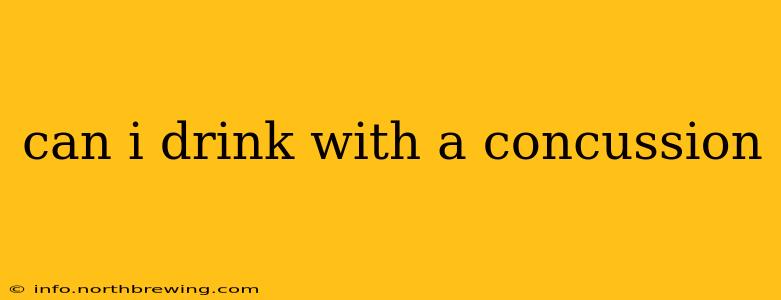A concussion is a traumatic brain injury (TBI) that can have serious short and long-term consequences. Drinking alcohol after a concussion is extremely dangerous and strongly discouraged by medical professionals. The effects of alcohol can significantly worsen the symptoms of a concussion and hinder the brain's healing process. This article will explain why alcohol and concussions are a dangerous mix and answer some frequently asked questions surrounding this topic.
Why is Alcohol So Dangerous After a Concussion?
Alcohol is a depressant, meaning it slows down brain activity. After a concussion, your brain is already vulnerable and trying to repair itself. Introducing alcohol further depresses brain function, potentially leading to:
- Increased risk of prolonged recovery: Alcohol can interfere with the brain's natural healing process, leading to a longer recovery time and potentially more severe long-term effects.
- Exacerbated symptoms: Common concussion symptoms like headaches, dizziness, nausea, and confusion can be significantly worsened by alcohol consumption. It can also trigger or worsen other symptoms you may not have experienced initially.
- Increased risk of secondary injuries: Impaired judgment and coordination due to alcohol can increase the risk of falls or other accidents that could cause further brain injury.
- Medication interactions: If you're taking medication for your concussion symptoms, alcohol can interact dangerously with these drugs, leading to harmful side effects.
- Mask symptoms: Alcohol can mask the severity of your concussion symptoms, making it difficult to accurately assess your condition and seek appropriate medical care.
What are the Long-Term Effects of Drinking With a Concussion?
The long-term effects of a concussion can be significant, and consuming alcohol can exacerbate them. Some potential long-term effects that can be worsened by alcohol include:
- Post-concussion syndrome (PCS): This condition involves persistent symptoms like headaches, dizziness, fatigue, and cognitive difficulties, lasting weeks, months, or even years after the initial injury. Alcohol can prolong or worsen these symptoms.
- Chronic traumatic encephalopathy (CTE): This is a progressive degenerative brain disease associated with repeated head trauma. While the exact cause is still being researched, alcohol consumption may increase vulnerability to developing CTE.
- Cognitive impairment: Alcohol can impair cognitive functions like memory, concentration, and executive function. These effects are magnified after a concussion, potentially leading to long-term cognitive deficits.
How Long Should I Avoid Alcohol After a Concussion?
There's no single definitive answer to this question as recovery timelines vary significantly depending on the severity of the concussion. However, it's crucial to abstain from alcohol until you're fully recovered and cleared by your doctor. This often means waiting several weeks or even months. Your doctor will be able to assess your progress and provide personalized guidance on when it's safe to resume alcohol consumption.
Can I Drink Coffee or Other Caffeine After a Concussion?
While alcohol is strictly off-limits, the effects of caffeine on concussion recovery are less clear-cut. Some people find that caffeine exacerbates their symptoms, while others don't experience any negative effects. It's best to monitor your response to caffeine and avoid it if you find it worsens your symptoms. Always consult your doctor before consuming caffeine or any other stimulants after a concussion.
What Should I Do If I Suspect I Have a Concussion?
If you suspect you've sustained a concussion, seek medical attention immediately. A healthcare professional can properly diagnose the injury, assess its severity, and recommend appropriate treatment and recovery strategies. Following their advice carefully is crucial for a safe and complete recovery.
In Conclusion
Drinking alcohol after a concussion is extremely risky and can significantly hinder your recovery. Prioritize your brain health by avoiding alcohol until you receive medical clearance. Your long-term well-being depends on it. Remember, the information provided here is for educational purposes and should not be considered medical advice. Always consult with a healthcare professional for diagnosis and treatment of a concussion.
